Personal Files Book 2, 23 February - 31 March 1915, Part 14
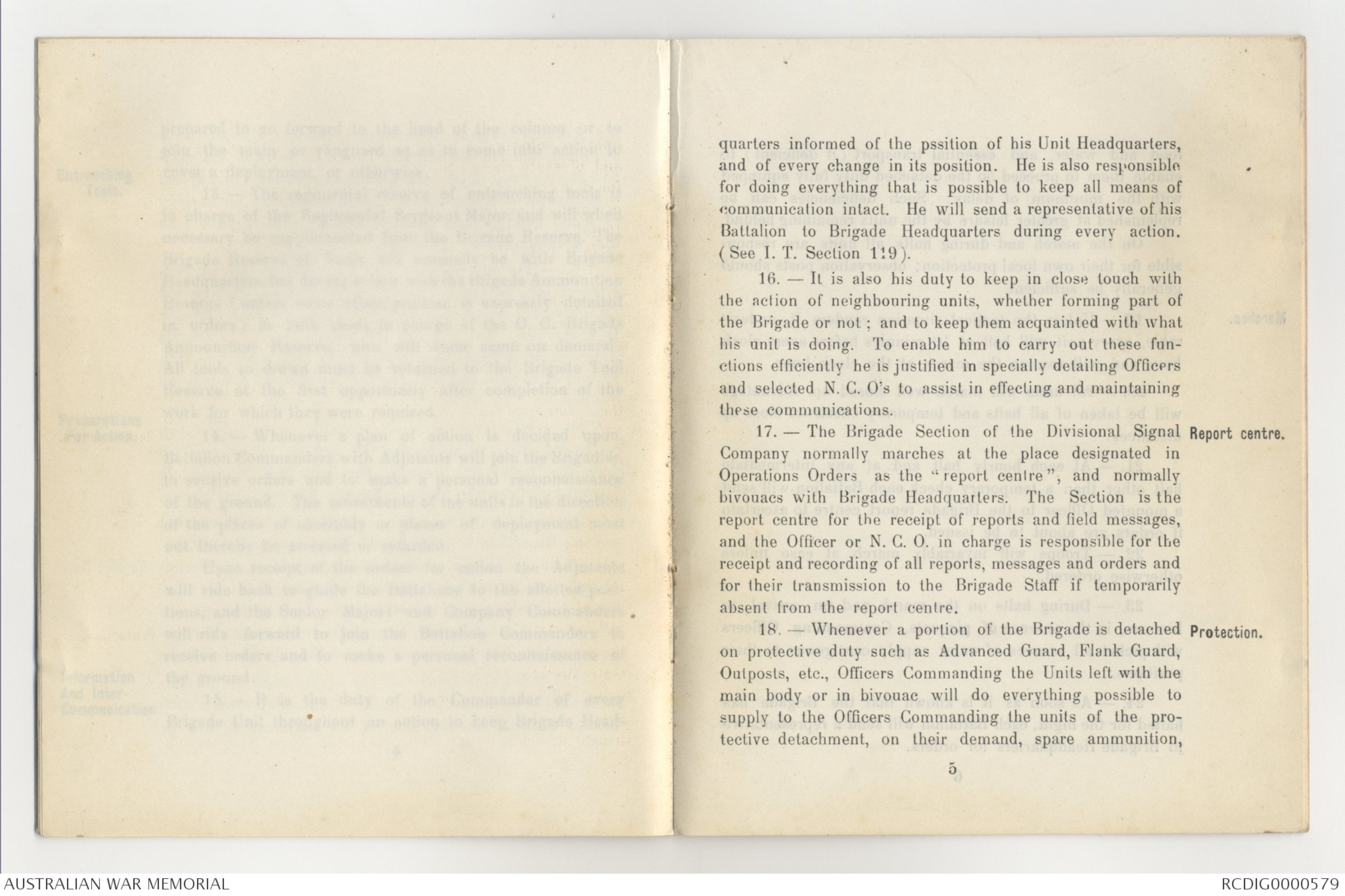
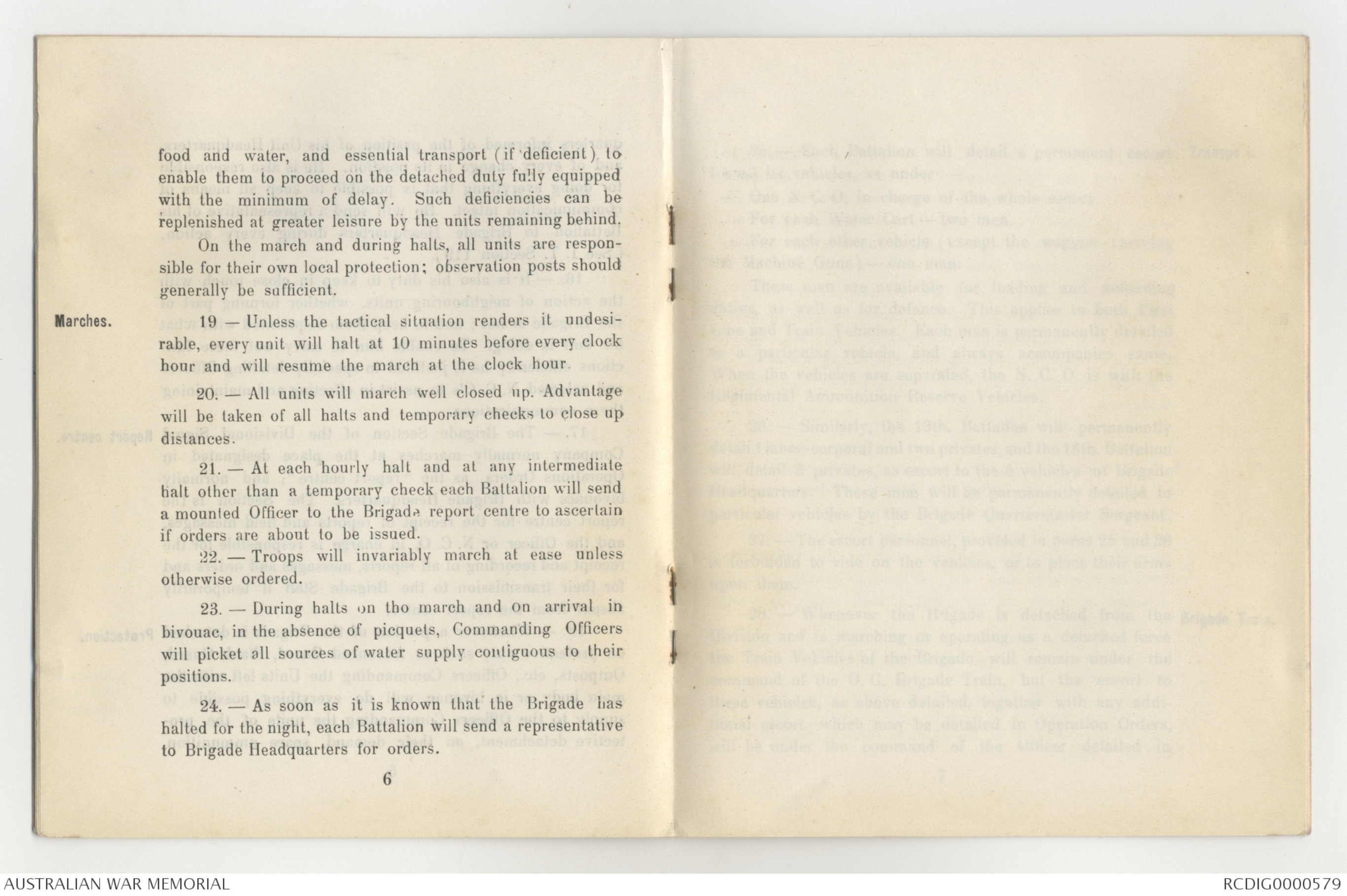
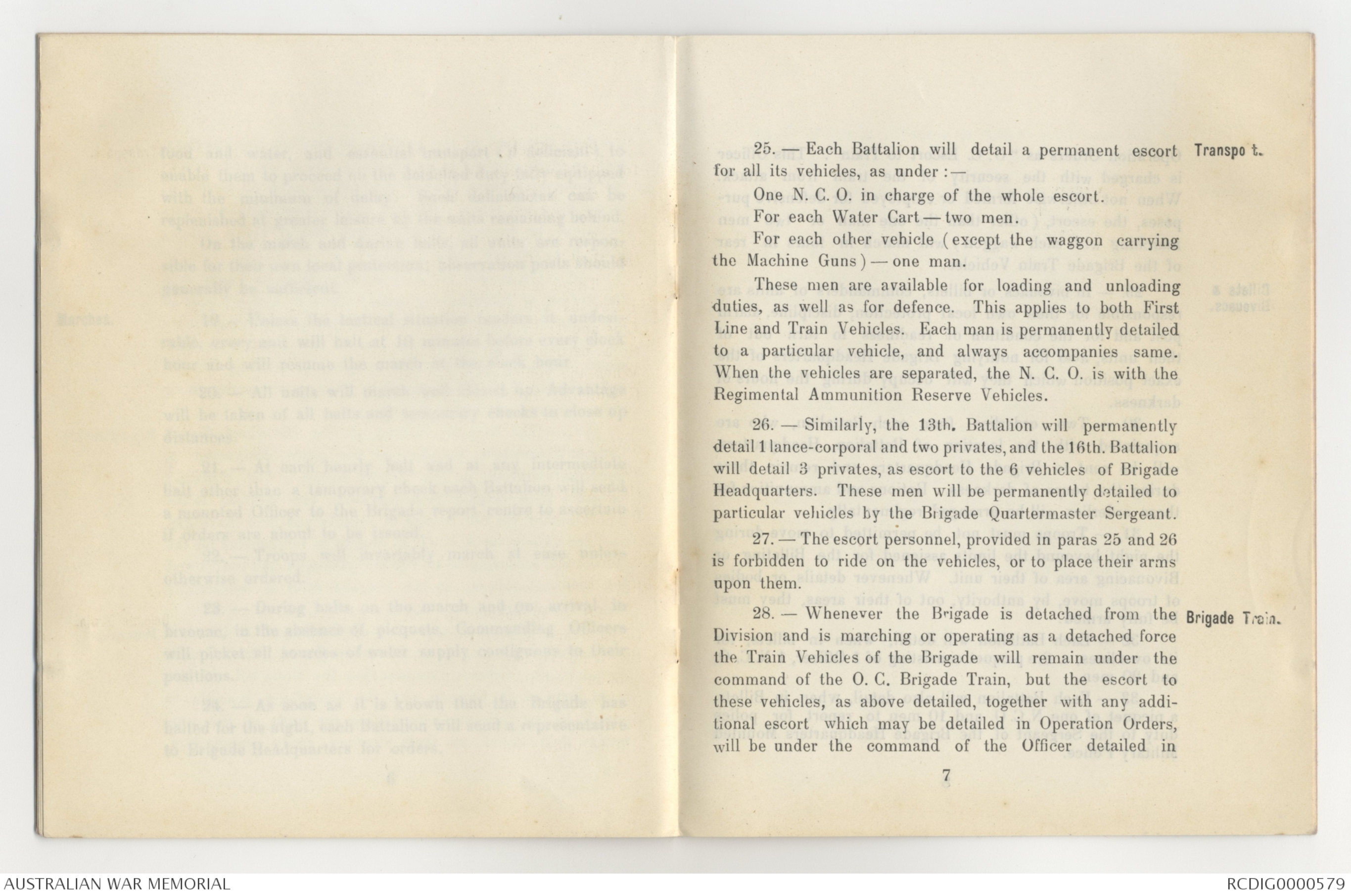
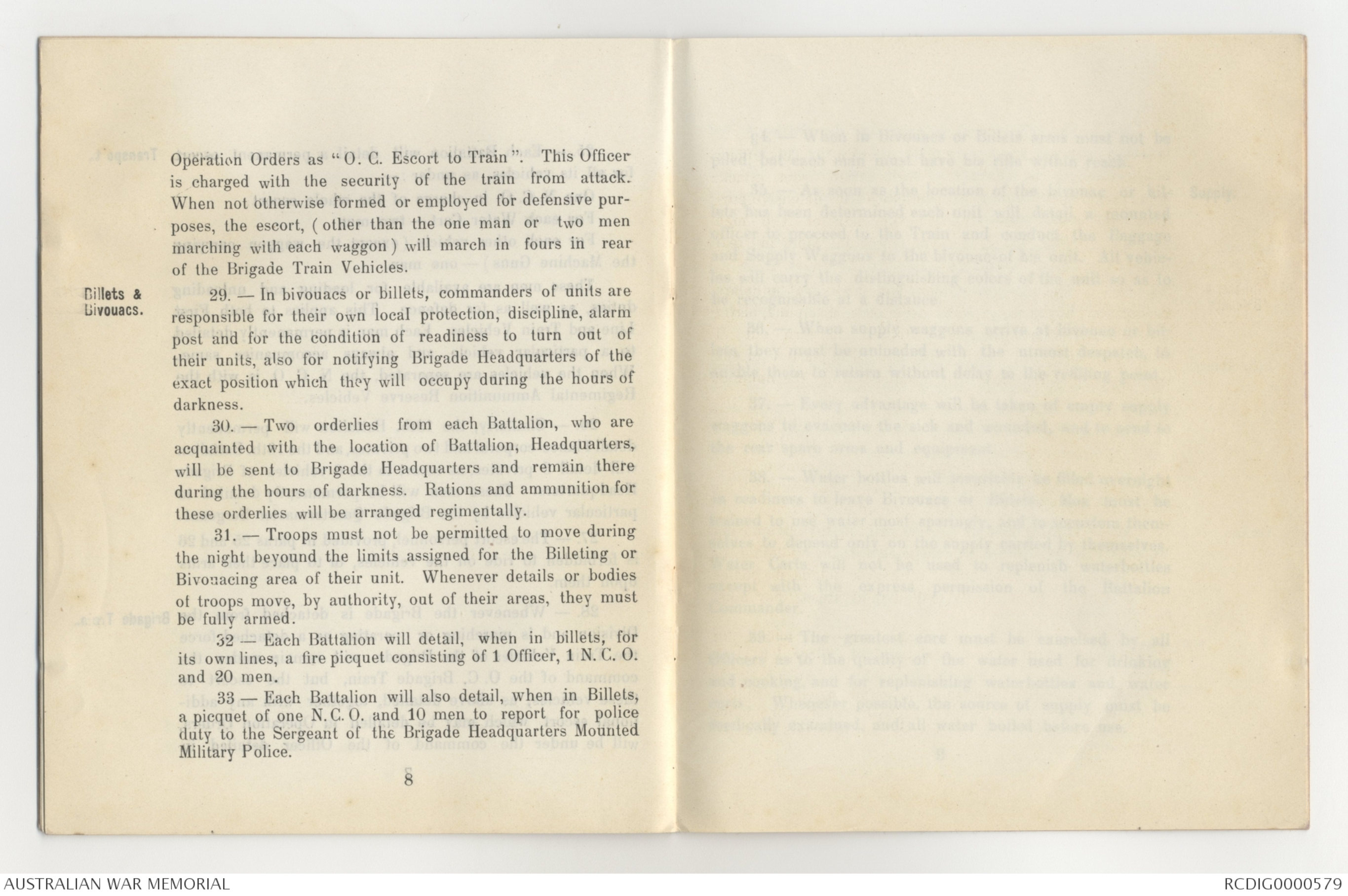
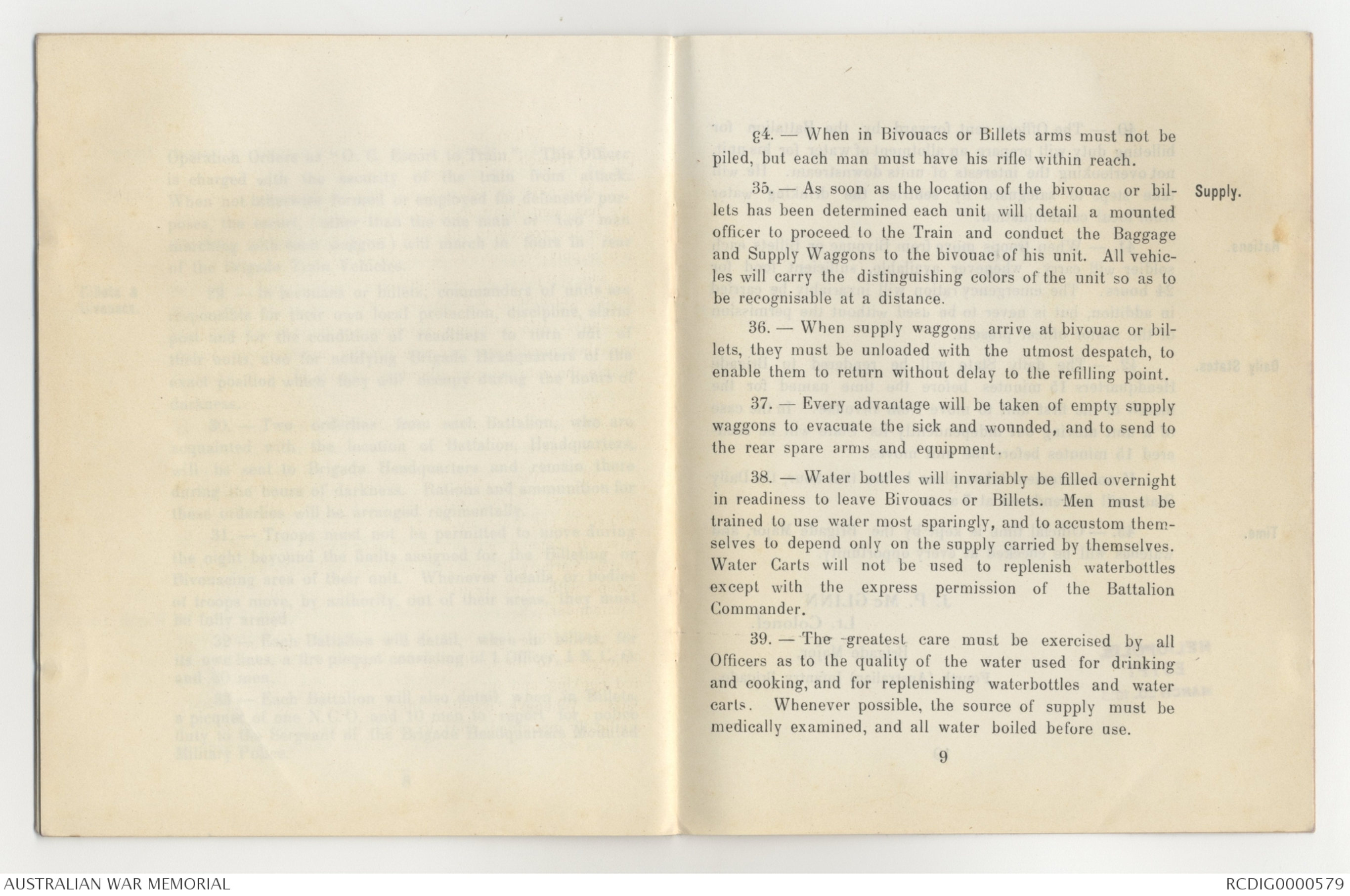
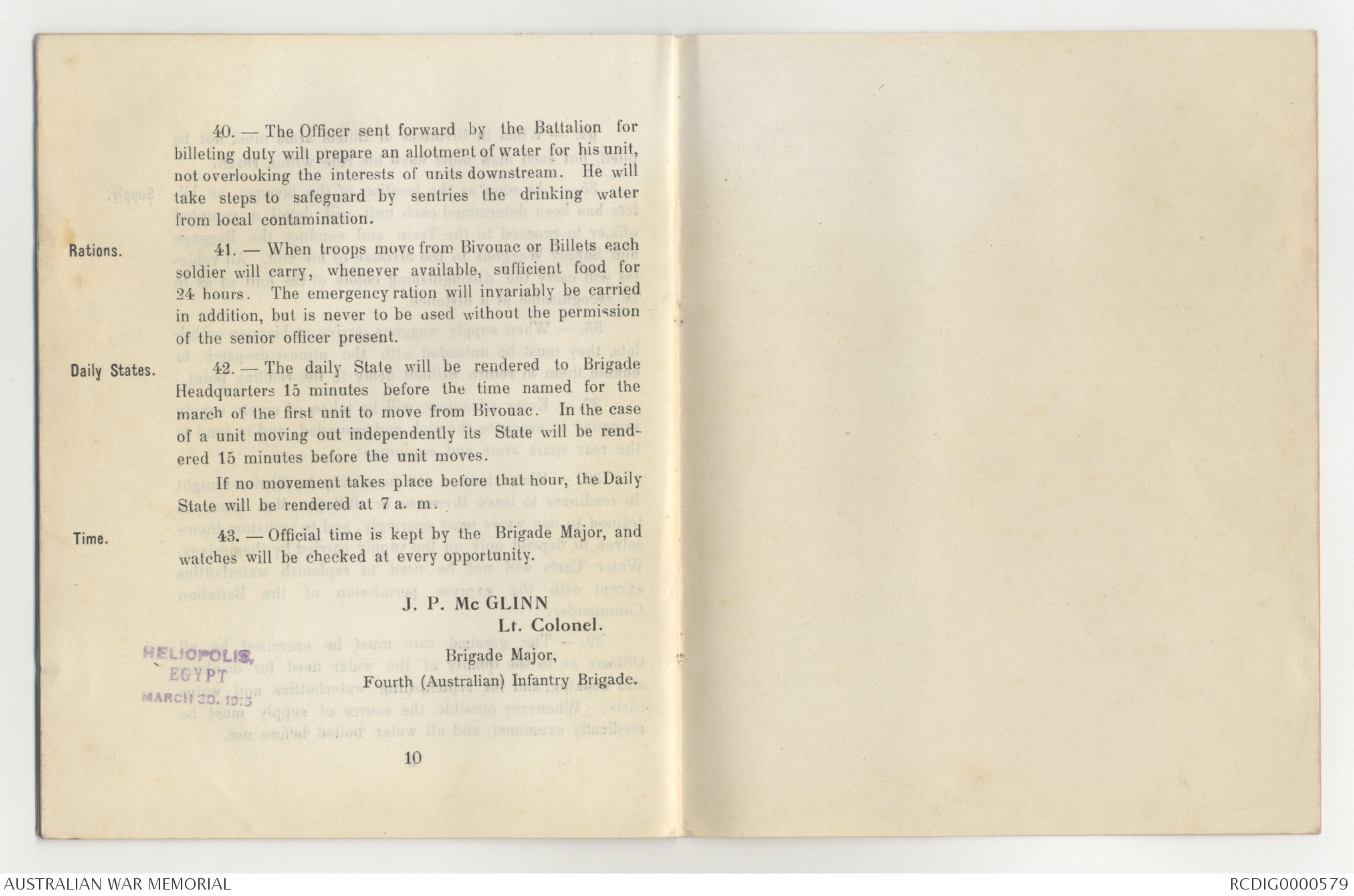
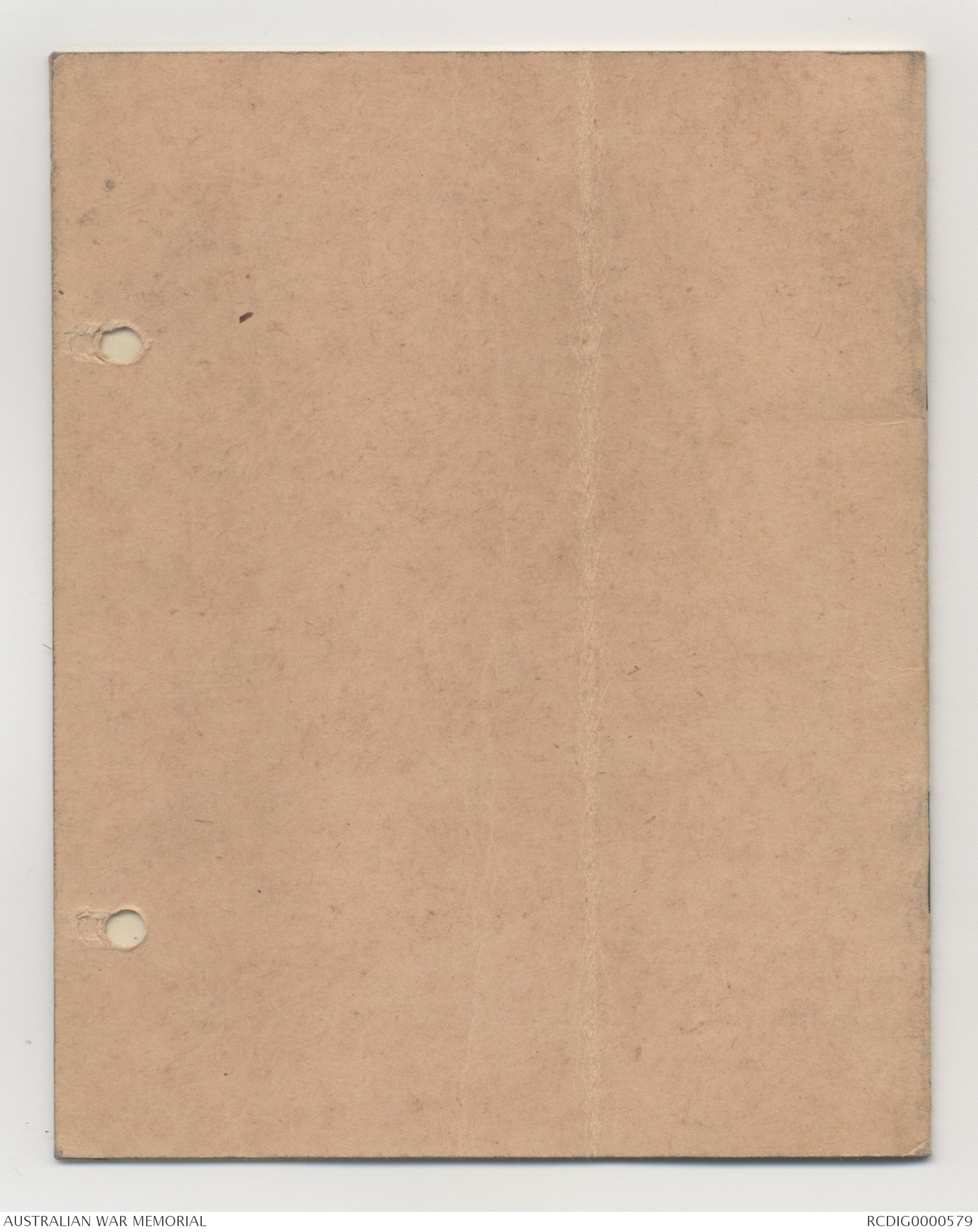
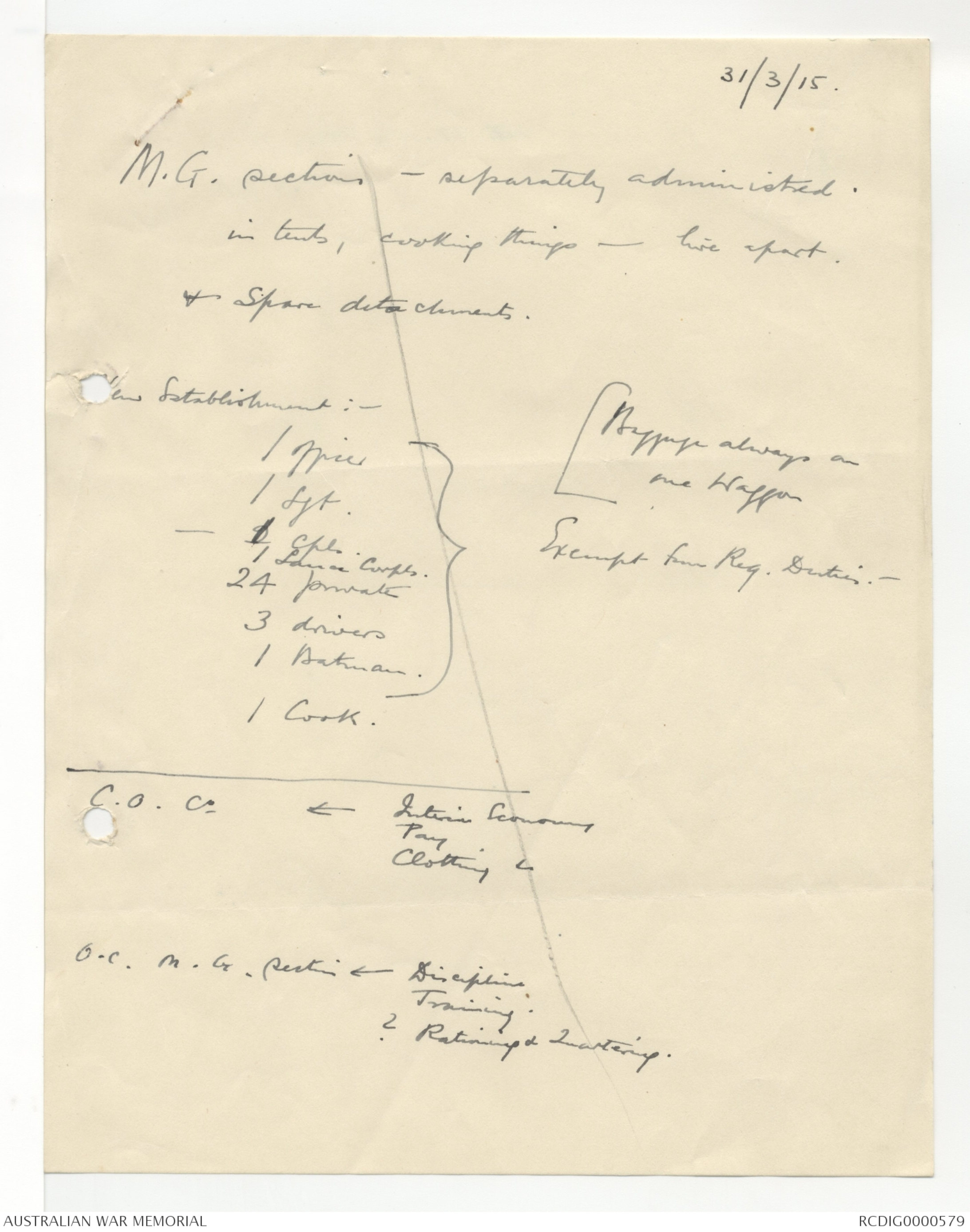
quarters informed of the pssition of his Unit Headquarters,
and of every change in its position. He is also responsible
for doing everything that is possible to keep all means of
communication intact. He will send a representative of his
Battalion to Brigade Headquarters during every action.
(See I. T. Section 119).
16. — It is also his duty to keep in close touch with
the action of neighbouring units, whether forming part of
the Brigade or not ; to keep them acquainted with what
his unit is doing. To enable him to carry out these functions
efficiently he is justified in specially detailing Officers
and selected N. C. O's to assist in effecting and maintaining
these communications.
[*Report centre.*]
17. — The brigade Section of the Divisional Signal
Company normally marches at the place designated in
Operations Orders as the "report centre", and normally
bivouacs with Brigade Headquarters. The Section is the
report centre for the receipt of reports and field messages,
and the Officer or N. C. O in charge is responsible for the
receipt and recording of all reports, messages and orders and
for their transmission to the Brigade Staff if temporarily
absent from the report centre.
[*Protection.*]
18. — Whenever a portion of the Brigade is detached
on protective duty such as Advanced Guard, Flank Guard,
Outposts, etc, Officers Commanding the Units left with the
main body or in bivouac will do everything possible to
supply to the Officers Commanding the units of the protective
detachment, on their command, spare ammunition,
food and water, and essential transport (if deficient) to
enable them to proceed on the detached duty fully equipped
with the minimum of delay. Such deficiencies can be
replenished at greater leisure by the units behind.
On the march and during halts, all units are responsible
for their own local protection: observation posts should
generally be sufficient.
[*Marches.*]
19. — Unless the tactical situation renders it undesirable,
every unit will halt at 10 minutes before every clock
hour and will resume the march at the clock hour.
20. — All units will march well closed up . Advantage
will be taken of all halts and temporary checks to close up
distances.
21. — At each hourly halt and at any intermediate
halt other than a temporary check each Battalion will send
a mounted Officer to the Brigade report centre to ascertain
if orders are about to be issued.
22. — Troops will invariably march at ease unless
otherwise ordered.
23. — During halts on the march and on arrival in
bivouac, in the absence of picquets, Commanding Officers
will picket all sources of water supply contiguous to their
positions.
24 — As soon as it is known that the Brigade has
halted for the night, each Battalion will send a representative
to Brigade Headquarters for orders.
6
[*Transpo t.*]
25. — Each Battalion will detail a permanent escort
for all its vehicles, as under :—
One N. C. O. in charge of the whole escort.
For each Water Cart — two men.
For each other vehicle (except the waggon carrying
the Machine Guns) — one man.
These men are available for loading and unloading
duties, as well as for defense. This applies to both First
Line and Train Vehicles . Each man is permanently detailed
to a particular vehicle, and always accompanies same.
When the vehicles are separated, the N. C. O. is with the
Regimental Ammunition Reserve Vehicles.
26. — Similarly, the 13th. Battalion will permanently
detail 1 lance-corporal and two privates, and the 16th. Battalion
will detail 3 privates, as escort to the 6 vehicles of Brigade
Headquarters. These men will be permanently detailed to
particular vehicles by the Brigade Quartermaster Sergeant.
27. — The escort personnel, provided in para 25 and 26
is forbidden to ride on the vehicles, or to place their arms
upon them.
[*Brigade Train.*]
28. — Whenever the Brigade is detached from the
Division and is marching or operating as a detached force
the Train Vehicles of the Brigade will remain under the
command of the O. C. Brigade Train, but the escort to
these vehicles, as above detailed, together with any additional
escort which may be detailed in Operation Orders,
will be under the command of the Officer detailed in
7
Operation Orders as "O. C. Escort to Train". This Officer
is charged with the security of the train from attack.
When not otherwise formed or employed for defensive purposes,
the escort, (other than the one man or two men
marching with each waggon ) will march in fours in rear
of the Brigade Train Vehicles.
[*Billets & Bivouacs*]
29. — In Bivouacs or billets, commanders of units are
responsible for their own local protection, discipline, alarm
post and for condition of readiness to turn out of
their units, also for notifying Brigade Headquarters of the
exact position which they will occupy during the hours of
darkness.
30. — Two orderlies from each Battalion, who are
acquainted with the location of Battalion, Headquarters,
will be sent to Brigade Headquarters and remain there
during the hours of darkness. Rations and ammunition for
these orderlies will be arranged regimentally.
31. — Troops must not be permitted to move during
the night beyond the limits assigned for the Billeting
or Bivouacing area of their unit. Whenever details or bodies
of troops move, by authority, out of their areas, they must
be fully armed.
32. — Each Battalion will detail, when in billets, for
its own lines, a fire picquet consisting of 1 Officer, 1 N. C. O.
and 20 men.
33. — Each Battalion will also detail, when in Billets,
a picquet of one N. C. O. and 10 men to report for police
duty to the Sergeant of the Brigade Headquarters Mounted
Military Police.
8
34.— When in Bivouacs or Billets arms must not be
piled, but each man must have his rifle within reach.
[*Supply*]
35. — As soon as the location of the bivouac or billets
has been determined each unit will detail a mounted
officer to proceed to the Train and conduct the Baggage
and Supply Waggons to the bivouac of his unit. All vehicles
will carry the distinguishing colors of the unit so as to
be recognisable at a distance.
36. — When supply waggons arrive at bivouac or billets,
they must be unloaded with the upmost despatch, to
enable them to return without delay to the refilling point.
37. — Every advantage will be taken of empty supply
waggons to evacuate the sick and wounded, and to send to
the rear spare arms and equipment.
38. — Water bottles will invariably be filled overnight
in readiness to leave Bivouacs or Billets. Men must be
trained to use water most sparingly, and to accustom themselves
to depend only on the supply carried by themselves.
Water Cart will not be used to replenish waterbottles
except with the express permission of the Battalion
Commander.
39. — The greatest care must be exercised by all
Officers as to the quality of the water used for drinking
and cooking, and for replenishing waterbottles and water
carts. Whenever possible, the source of supply must be
medically examined, and all water boiled before use.
9
40. — The Officer sent forward by the Battalion for
billeting duty will prepare an allotment of water for his unit,
not overlooking the interests of units downstream. He will
take steps to safeguard by sentries the drinking water
from local contamination.
[*Rations.*]
41. — When troops move from Bivouac or Billets each
soldier will carry, whenever available, sufficient food for
24 hours. The emergency ration will invariably be carried
in addition, but is never to be used without the permission
of the senior officer present.
[*Daily States.*]
42. — The daily State will be rendered to Brigade
Headquarters 15 minutes before the time named for the
march of the first unit to move from Bivouac. In the case
of a unit moving out independently its State will be rendered
15 minutes before the unit moves.
If no movement takes place before that hour, the Daily
State will be rendered at 7 a.m.
[*Time.*]
43. — Official time is kept by the Brigade Major, and
watches will be checked at every opportunity.
J.P. McGLINN
Lt. Colonel.
Brigade Major,
Fourth (Australian) Infantry Brigade.
HELIOPOLIS
EGYPT
MARCH 30, 1915
10
31/3/15
M.G. sections - separately administered
in tents, cooking things — live sport,
& spare detachments.
(*Baggage always on
one waggon*)
New Establishment:-
1 officer }
1 Sgt. }
1 Cpls. }
1 Lance Corpls.} Exempt from Reg. Duties:-
24 privates }
3 drivers }
1 Batman. }
1 Cook.
_____________________________________________
C.O. Co <— Interim Economy
Pay
Clothing
O.C. M.G. Section <— Discipline
Training
? Rationing & Quartering.
 Jacqueline Kennedy
Jacqueline KennedyThis transcription item is now locked to you for editing. To release the lock either Save your changes or Cancel.
This lock will be automatically released after 60 minutes of inactivity.